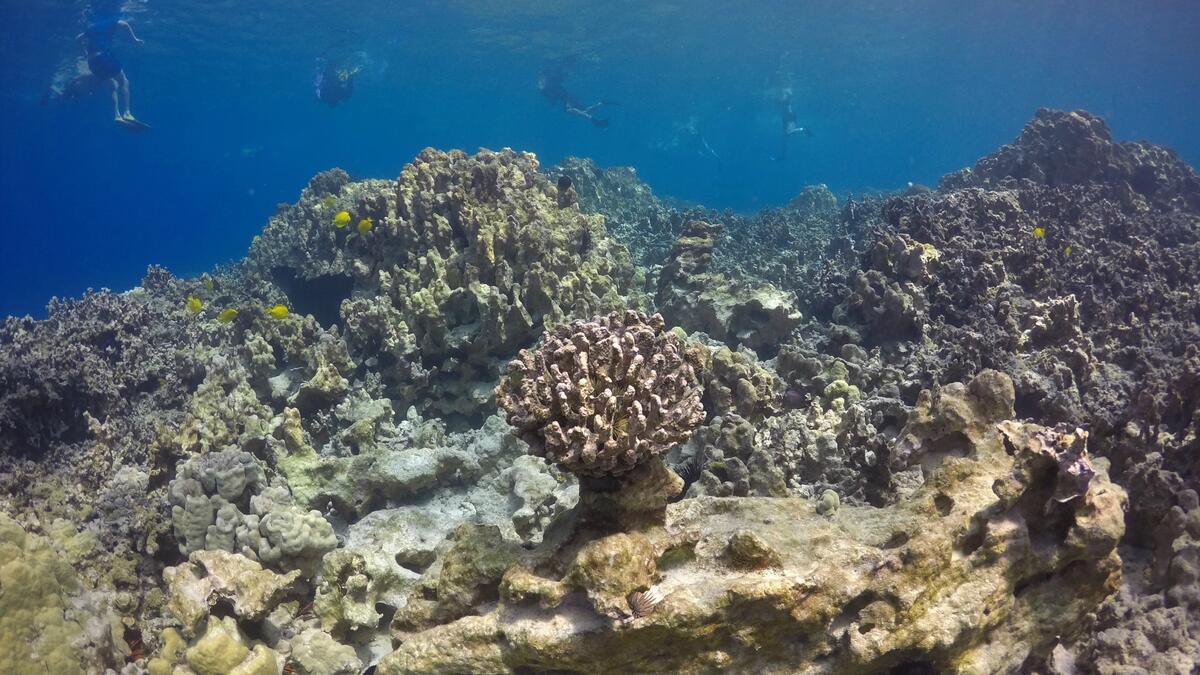ASU center announces Hawaii coral reef conservation program in partnership with Lenfest Ocean Program

A bleached coral reef in Honaunau, Hawaii. Without rapid intervention, coral reefs will continue to degrade, resulting in what may be the first human-caused loss of an entire biome. Photo courtesy of Chris Balzotti
Arizona State University’s Center of Global Discovery and Conservation Science (GDCS) is entering into a partnership with the Lenfest Ocean Program in Washington, D.C., to generate high-resolution maps of nearshore coral reef habitats across the eight main Hawaiian Islands. These maps will provide information about the extent of living and dead coral reefs and help state managers to identify areas for conservation.
The program will support ongoing GDCS efforts to improve reef management and conservation in the Hawaiian Islands including targeted support for the state’s innovative Marine 30x30 Initiative, which aims to conserve at least 30 percent of the state’s coral reefs by 2030. The Marine 30x30 Initiative was founded in 2016 by Gov. David Ige to address the alarming losses in coral extent and health that have taken place over the past 50 years and to mitigate future damage.
“Pollution, overfishing and ocean warming threaten Hawaii’s coral reefs, and the state has started an initiative to address these concerns,” said Charlotte Hudson, director of the Lenfest Ocean Program. “This work has the potential to help managers and local communities identify areas for effective management.”
Greg Asner, the GDCS director and a pioneer in airborne mapping conservation efforts, will lead the new program. Asner and his team have already collected raw data from previous flight surveys of more than 750 miles of Hawaiian coastlines. With these data, they will develop and disseminate maps of these ecosystems to help state managers evaluate the state’s reef habitats, as well as engage local communities as the Marine 30x30 Initiative transitions from planning to development and implementation of management measures. The project started in March 2019 and will span one year. Maps will be produced starting in mid-2019 to allow engagement with partners and the public and to revise maps as needed.
“Successful reef conservation requires numerous decisions by leaders, communities and managers in the Hawaiian islands, including issues of coastal development, fishing and other manageable factors, at the scale of entire reef ecosystems,” Asner said. “To do that, we have to provide people with geographically extensive information that generates spatially explicit options and solutions. Without doing so, we will continue to lose large expanses of coral reef in the face of resource mismanagement and climate change-induced ocean warming.”
The Lenfest Ocean Program funds research projects that address the needs of marine and coastal stakeholders, and it supports grantees in engaging with the people most likely to use the results. It has provided $250,000 to GDCS for the work.
More Science and technology

ASU professor wins NIH Director’s New Innovator Award for research linking gene function to brain structure
Life experiences alter us in many ways, including how we act and our mental and physical health. What we go through can even…

ASU postdoctoral researcher leads initiative to support graduate student mental health
Olivia Davis had firsthand experience with anxiety and OCD before she entered grad school. Then, during the pandemic and as a…

ASU graduate student researching interplay between family dynamics, ADHD
The symptoms of attention deficit hyperactivity disorder (ADHD) — which include daydreaming, making careless mistakes or taking…